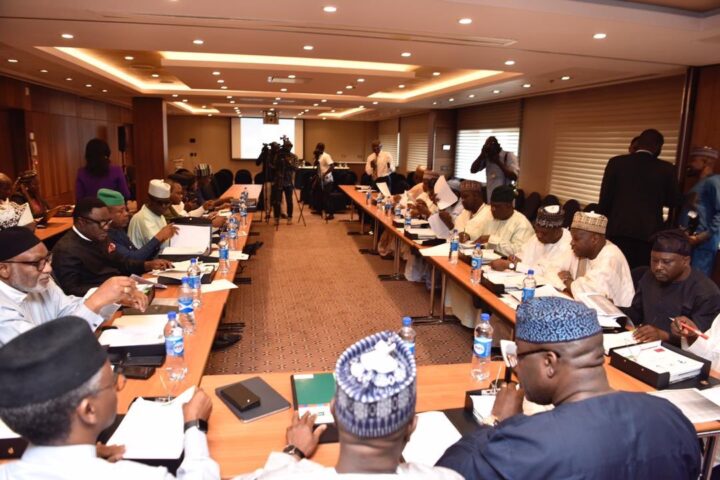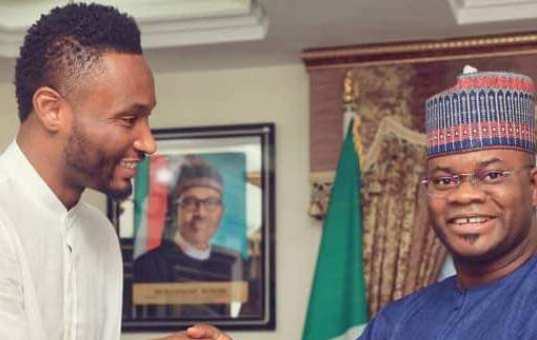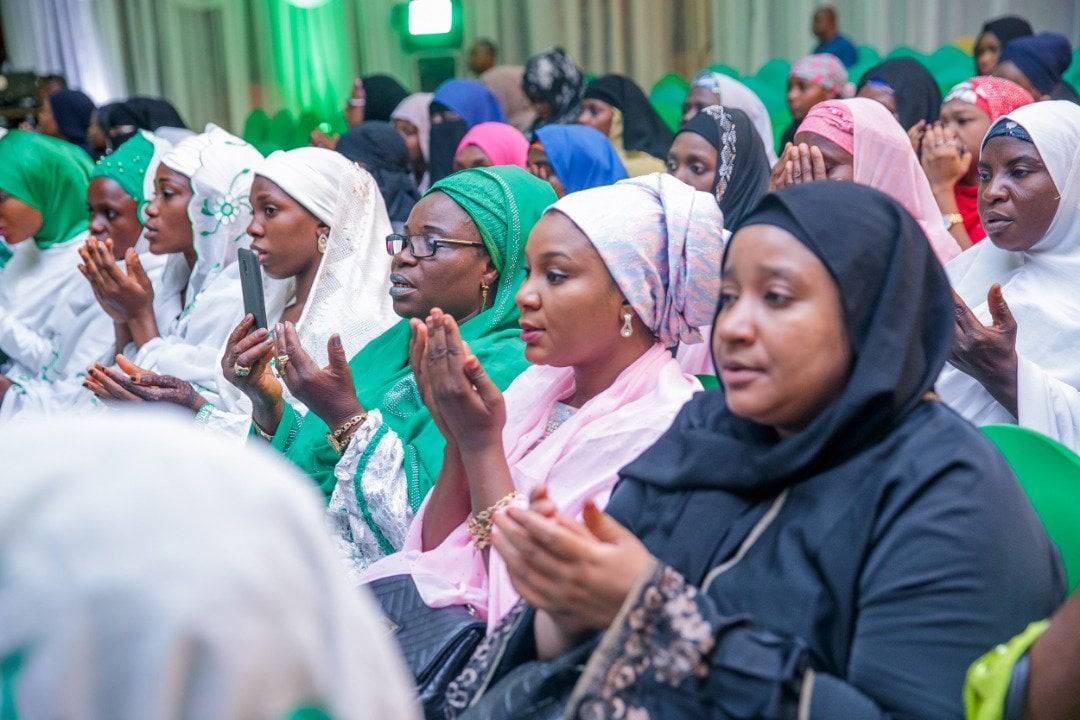BY MACK OGBAMOSA
The present spate of insecurity in the country has heightened the level of interrogation of the role of governors as Chief Security officers of their states. Many Nigerians are wondering why governors are complaining that they cannot secure their states despite being Chief Executives of their territories with free access to security votes. While this writer is not in any way holding brief for governors, there is need to point out some of the constitutional and other limitations to the effectiveness of governors as Chief Security officers.
LIMITATIONS ON GOVERNORS’ POWERS AS CHIEF SECURITY OFFICERS
Although, our 1999 Constitution(as amended) gave them executive powers over their states, it did not give them powers to venture into issues being handled by the Federal Government or to control the two major institutions responsible for maintenance of peace and internal security in the country. These are the Nigeria Police Force and the Armed Forces of the Federation. For instance, Section 5(2a) of the Constitution gives executive powers to the governors. It states: “Subject to the provisions of this Constitution, the executive powers of a state ” Shall be vested in the Governor of that state and may subject to the aforesaid and to the provision of any law made by the House of Assembly be exercised by him either directly or through the Deputy Governor and Commissioners of the government of that state or officers in the public service of the state; and
(2b) Shall extend to the execution and maintenance of this Constitution and laws made by the House of Assembly of the State and to all matters with respect to the House of Assembly has for the time being power to make law.”
But there is a limitation to this provision in Section 5(3) which states that: “The executive powers vested in a state under subsection (2) of this Section shall be exercised as not to :
(a) impede or prejudice the exercise of the executive powers of the Federation;
(b) endanger any asset or investment of the Government of the Federation in the state ; or
( c ) endanger the continuance of a federal government in Nigeria.”
APPOINTMENT AND OPERATIONAL USE OF THE POLICE AND THE ARMED FORCES
The appointment of the heads of our security agencies and the operational use of the forces are under the control of the president. Governors cannot interfere in these matters.
Section 215 (1a ) states: “There shall be an Inspector- General of police, who subject to Section 216(2) of the Constitution shall be appointed by the President on the advice of Nigeria Police Council from among serving members of the Nigeria Police Force.” Despite being members of the Nigeria Police Council, governors do not play any meaningful role in the appointment of the Inspector- General. Their role is only advisory which can be jettisoned by the President in making his decision.
Advertisement
The operational use of the police is also under the control of the Federal government. Section 215(2) states:” The Nigeria Police Force shall be under the command of the Inspector- General of police and any contingent of the Nigeria Police Force stationed in a state shall subject to the authority of the Inspector- General of police, be under the Command of commissioner of police in that state while sub-section 215(3) states: “The President or such other Minister of the Government of the Federation as he may authorise in that behalf may give to the Inspector- General of police such lawful directions with respect to the maintenance and securing of public safety and public order as he may consider necessary, and the Inspector- General of police shall comply with those directions or cause them to be complied with.”
Even though a State Police Commissioner is supposed to liaise with the governor in respect of security matters, such commissioner is not obliged to take instructions or orders from the governor without getting clearance from the Inspector – General who himself takes orders directly from the President. According to Section 215(4 ) ,”Subject to the provisions of this Section, the Governor of a state or Commissioner of the Government of the state as he may authorise in that behalf, may give to the Commissioner of Police of that state such lawful directions with respect to the maintenance and securing of public safety and public order within the state as he may consider necessary, and the commissioner of police shall comply with those directions or cause them to be complied with
Provided that before carrying out any such directions under the foregoing provisions of the subsection, the Commissioner of police may request that the matter be referred to the President or such Minister of Government of the Federation as may be authorised in that behalf by the President for his directions. Sub-section 215(5) states: “The question whether any , and if so what, directions have been given under this Section shall not be inquired into in any Court.”
Advertisement
SIMILAR PROVISIONS IN THE POLICE ACT
These provisions in the Constitution are similar to those in the Police Act.
For instance the Police Act, No 2, 2020, gives the power to appoint the Inspector- General of police to the President . It also gives the Inspector- General the power to have control over the operational use of the police.
Section 7 ( 1) of the Act states: “The Inspector-General of Police is the head of the Nigeria Police and shall exercise full command and operational control over the police and all its departments and units.
Section 7(3) states: “The Inspector-General of police shall be appointed by the President on the advice of the Police Council among serving police officers.”
This advisory role of the Police Council is neither binding on the President nor can the Council interfere on the operational control of the police force.
Section 6(3(a) states that “The functions of the Police Council include: the organisation and administration of the Police Force and all other matters relating to the Police Force ( not being matters relating to the use and operational control of the Police Force or the appointment, disciplinary control and dismissal of members of the Police Force)”.
THE ARMED FORCES AND THE CONSTITUTION
As with the Police Force, so it is with the armed forces. The appointment of the heads of the various branches of the armed forces and operational control are exclusively reserved for the President.
Section 217(1) of our Constitution states that: “There shall be an armed forces for the Federation which shall consist of an Army, a Navy and Air Force and such other branches of the armed forces of the Federation as may be established by an Act of the National Assembly. Section 217(2) states that: “The Federation shall subject to an Act of the National Assembly made in that behalf, equip and maintain the armed forces as may be considered adequate and effective for the purpose of –
(a) defending Nigeria from external aggression;
(b) maintaining the territorial integrity and securing its borders from violation on land, sea or air;
(c) Suppressing insurrection and acting in aid of civil authorities to restore order when called upon to do so by the President, but subject to such conditions as may be prescribed by an Act of the National Assembly; and
(d) Performing such other functions as may be prescribed by the National Assembly ”
Section 218(1- 3) confers the appointment of the various heads of the armed forces as well as command and operational use of same on the President.
According to 218(1), “The powers of the President as the Commander-in- Chief of the Armed Forces of the Federation shall include power to determine the operational use of the armed forces of the Federation.”
218(2) says : “The powers conferred on the President by sub-Section (1) of this Section shall include power to appoint the Chief of Defence Staff, Chief of Army Staff , the Chief of Naval Staff and the Chief of Air Staff and heads of any other branches of the armed forces of the Federation as may be established by an Act of the National Assembly.
Advertisement
NATIONAL ASSEMBLY CAN REGULATE POWERS OF PRESIDENT
Only the National Assembly can regulate the powers of the President in respect of some of these matters. This regulation is specified in Section 218(4) which states that ” The National Assembly shall have power to make laws for the regulation of –
(a) the powers exercisable by the President as Commander-in-Chief of the Armed Forces of the Federation; and
(b) the appointment, promotion and disciplinary control of members of the armed forces of the Federation. ”
THE ARMED FORCES ACT
Like the Constitution, the Armed Forces Act does not have a place for the role of governors either as advisers or collaborators in the appointment and operational use of the forces. These powers are exclusively under the control of the Federal Government. Unlike the Police Council which has governors as members, the Armed Forces Council as contained in the Armed Forces Act, does not have a place for governors.
Section 4(2) of the Armed Forces Act states that: “The Council shall consist of :
(a) the President who shall be the Chairman
(b) the Minister of Defence
(c) the Chief of Defence Staff
(d) the Chief of Army Staff
(e) the Chief of Naval Staff, and
(f) the Chief of Air Staff…”
This Council reports to the President.
Section 5 of the Act states: “Subject to the provisions of sub-section (2) of this Section, the Forces Council shall be responsible under the general authority of the President, for the command, discipline and administration of, and for all other matters relating to the Armed Forces.
OPERATIONAL USE OF THE ARMED FORCES
Under the Armed Forces Act, the operational use of the Armed Forces is vested in the President.
Section 8(1) of the Act states: “The President shall determine the operational use of the Armed Forces, but may under general or special directives, delegate for the day- to- day operational use –
Advertisement
(a) Of the Armed Forces to the Chief of Defence Staff,
(b) Of the Army, to the Chief of Army Staff;
(c) Of the Navy,to the Chief of Naval Staff;
(d) Of the Air Force, to the Chief of Air Staff”
Section 8(3) defines operational use of the Armed Forces to include “… the operational use of the Armed Forces in Nigeria for the purpose of maintaining and securing public safety and public order”
Advertisement
PUBLIC ORDER ACT (CAP P42)
This is an Act to repeal all public order laws in the states in the Federation and to replace them with a Federal act for the purpose of maintaining public order and to forbid the formation of quasi – military organisations, regulate the use of uniforms and other matters ancillary thereto.
Although, the Act gives powers to governors to regulate assemblies, meetings and processions in their various states working in collaboration with the Commissioners of Police in the states, the overriding power of regulation of public order and safety is with the President.
Section 11(1) of the Act states that: “The President, on the advice of the Council of State, may make regulations generally for the purpose of carrying into effects the objects of this Act.
(2) Subject to subsection(1) of this Section, the President may from to time issue to the Nigeria Police Force such general or special guidelines as he considers expedient for the better and uniform administration throughout Nigeria of the provisions of this Act.”
UNIFORMITY OR CENTRALIZATION OF SECURITY ARCHITECTURE
From the above analysis, it is clear that the laws regulating security matters in the country are largely centralised. This is neither the making of the President nor that of the governors. It is borne out of the unitary system of of government inherited from our prolonged military rule.
Advertisement
WHAT THE GOVERNORS ARE DOING
Since the governors cannot circumvent the laws of the land, they feel they cannot secure their states as Chief Security Officers. While some of them use their security votes as entertainment allowance , others actually
use their security votes to support the efforts of the police in their states by buying vehicles and other security gadgets as well as give extra allowances to security officers.
Many of them have decided to form regional or state security operatives like Amotekun and Ebube Agu whose legality is being put to question going by the provisions of the Constitution , the Police Act , the Armed Forces Act and the Public Order Act.
WHAT IS TO BE DONE ?
The first thing to do to enhance security in the country is to urgently amend our 1999 Constitution. The Constitution should be amended to decentralise and democratise policing by having state police which will be in control of all matters within the competence of the state. For example, kidnapping is ordinarily crime within the competence of a state. If there were state police, it would have been easier to tackle this problem.
Advertisement
LOYALTY OR ALLEGIANCE OF THE POLICE AND MILITARY
The police and the armed forces should be made to owe their loyalty to the Constitution not the President or governors.
ALLOCATION OF MORE RESOURCES TO THE STATES
The clarion call for allocation of more resources to the states as part of restructuring by amending the current allocation formula should be heeded so that states would be able to take care of state police.
TACKLE POVERTY,UNEMPLOYMENT AND INEQUALITY
Beyond all these, there must be deliberate efforts to tackle the high level of poverty, unemployment and inequality in the country by not only revamping our economy but amending the Constitution to make the socio-economic rights in Chapter II of the Constitution enforceable. These will not only make government responsible but also considerably reduce the level of injustice and insecurity in the country.
Mack Ogbamosa, a legal practitioner/communications consultant, is based in Lagos
Views expressed by contributors are strictly personal and not of TheCable.
Add a comment





